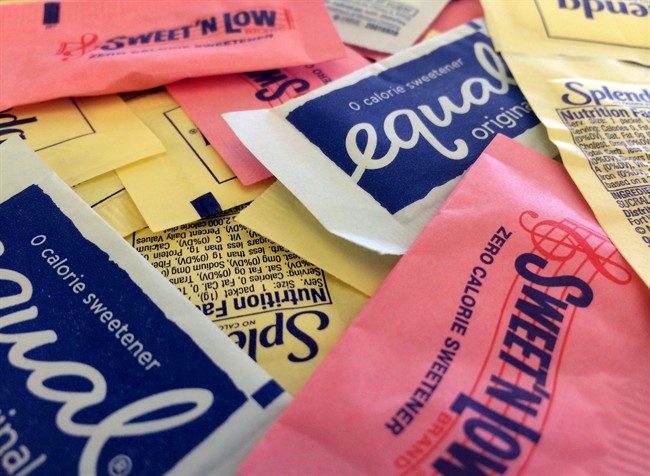Artificial sweeteners have been tied to excess belly fat, overeating and diabetes risk, but now Italian researchers say sucralose — or Splenda — increases risk of leukemia and other cancers.

The findings are stirring up controversy: consumer advocacy groups already increased their warnings from “caution” to “avoid” in light of the results, while Splenda and others debunking the study are calling it “poorly conducted.”
Scientists out of the Ramazzini Institute in Bologna say mice were more likely to develop leukemia and other blood-related cancers after they were given excessive amounts of sucralose — about 457 male and 396 female mice were given varying amounts of the artificial sweetener added to their feed.
The dosages went from zero to 500, 2,000, 8,000 and 16,000 parts per million (ppm). 500 ppm is about 60 milligrams of sucralose per kilogram of body weight — that means the mice were having four times more than the acceptable daily intake for humans, according to estimates.
READ MORE: Is diet soda adding to your belly fat?
As the rodents’ Splenda intake increased, their risk of malignant cancer crept up, too.
“The aim of this study was to evaluate the carcinogenic effect of sucralose in mice, using a sensitive experimental design,” the researchers wrote.
They said their findings don’t line up with previous data that concluded that sucralose is chemically inactive.
- Solar eclipse eye damage: More than 160 cases reported in Ontario, Quebec
- 3 women diagnosed with HIV after ‘vampire facials’ at unlicensed U.S. spa
- ‘Super lice’ are becoming more resistant to chemical shampoos. What to use instead
- Canadian man dies during Texas Ironman event. His widow wants answers as to why
“More studies are necessary to show the safety of sucralose…considering that millions of people are likely exposed, follow-up studies are urgent,” they concluded.
Sucralose is marketed under the brand name Splenda. It’s widely used in soft drinks, candy, baked goods, frozen desserts and ice cream. It’s even used for home cooking and baking.
The Center for Science in the Public Interest ended up downgrading its safety rating of sucralose for the second time in the wake of the Italian research. It’s now telling consumers to “avoid” the artificial sweetener. In 2013, it downgraded sucralose from “safe” to “caution” on the heels of Ramazzini Institute findings, too.
Read its full explanation about the downgrade.
READ MORE: Why diet soda may be making you eat more
Splenda’s makers — Heartland Food Products Group — isn’t pleased with the Italian research or the CSPI’s worsening ratings, calling both “misleading” and full of “misperceptions.”
“Researchers have conducted more than 100 scientific studies on the safety of sucralose over the past 20 years — and they’ve all declared sucralose safe to enjoy. Sometimes, however, poorly conducted and unscientific studies make bold headlines and stir up safety fears,” Splenda said on its Facebook page.
In response to the CSPI’s downgrading, the company said the rating is “based solely on one study of mice” and doesn’t match up with other research on sucralose.
Splenda’s makers say regulatory authorities around the world, including Health Canada, haven’t found a link between sucralose and cancer.
Other critics chimed in, too. IFLScience notes that the institute’s 2012 research declared aspartame as carcinogenic. That claim was enough to scare European Union officials to study the sugar substitute.
The EU concluded that the mice in the Ramazzini study likely already had cancer that wasn’t the result of aspartame consumption.
Forbes criticized that research, too.
READ MORE: Could sugar substitutes cause diabetes?
“No matter what substance the Institute tests for cancer, the results always seem to be positive, whereas other laboratories testing the same substances repeatedly fail to come up with the same findings,” they wrote.
Either way, experts not involved in the research say its worth noting the study was only done in mice so they won’t necessarily translate in humans.
So is sucralose safe?
It is, according to the Dietitians of Canada, the Canadian Diabetes Association and Eat Right Ontario.
“Health Canada must approve all the artificial sweeteners that are sold in Canada. A sweetener has to undergo extensive research to show its safety and effectiveness before Health Canada will approve it for use,” DC says on its website.
Health Canada says sugar substitutes are subject to rigorous controls under the federal agency’s Food and Drugs Act, according to its website.
The Ramazzini Institute’s full findings were published in the International Journal of Occupational and Environmental Health. Read the study.
carmen.chai@globalnews.ca
Follow @Carmen_Chai//



Comments